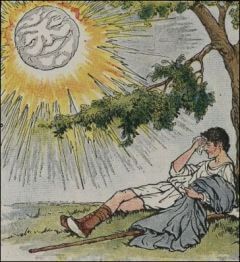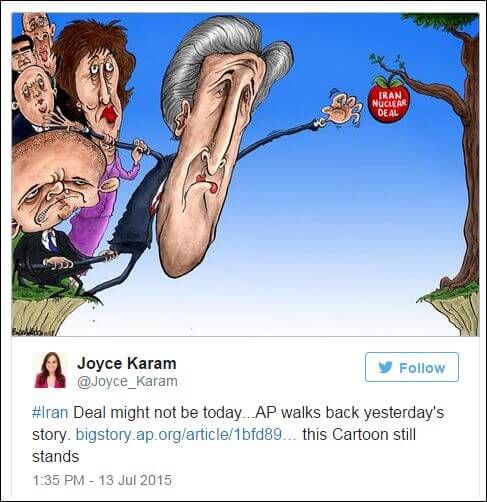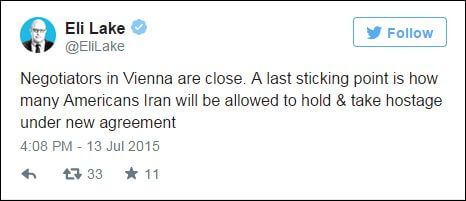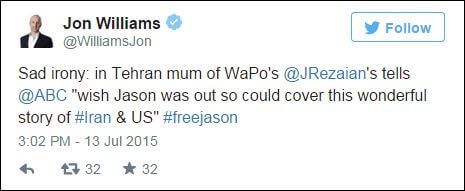Today’s Top Stories
1. I don’t know what’s happening in Vienna, but an announcement that a nuclear agreement has been reached probably won’t be in the offing by the time you read this roundup.
The talks will continue even as an agreement remains elusive. According to AP, diplomats are still snagged on A) attempts to probe Iran’s weaponization efforts, B) the lifting of a UN arms embargo, and C) Tehran’s “insistence that any U.N. Security Council resolution approving the nuclear deal be written in a way that stops describing Iran’s nuclear activities as illegal.”
Will there be an agreement, an extension, or a blowup? Every little development is being scrutinized for meaning. Stay tuned . . .
2. Haaretz: Israel agreed to discuss the West Bank situation with EU diplomats, but the agenda itself is up for discussion.
A senior official in Jerusalem said that while the EU wanted to discuss construction of settlements and steps that could threaten the two-state solution, Israel made clear it was prepared only for the talks to deal with improving the economic situation for Palestinians in the West Bank and the Gaza Strip . . .
Israel’s second condition is that negotiations not deal with issues involving a permanent agreement between Israel and the Palestinians.
3. Following Islamic State’s Sinai offensive, Israel began outfitting commercial planes servicing Eilat with missile defense pods. The SkyShield system being installed on Arkia and Israir planes uses lasers and a thermal camera to deflect rockets away from aircraft.
4. Jerusalem’s Old City is not “endangered.” Please add your name to our letter demanding CNN report accurately about the holy city.
Israel and the Palestinians
• IDF military police are probing at least five senior officers over Gaza war. According to the Times of Israel:
Because the probes center around judgement calls, a fierce debate has erupted within the IDF between those who believe the incidents warrant full Military Police investigations, which can lead to criminal prosecution, and those who want the inquiries limited to operational debriefings, which are usually dealt with internally.
A senior source told Army Radio that it is unlikely that any of the officers will be indicted.
• AP: UNESCO backs Jordan as Jesus’ baptism site as debate goes on.
• Britain’s new ambassador to Israel, David Quarrey, took up his post today. Quarrey replaces Matthew Gould, the first Jew to hold the position.
Around the World
• In his first interview as director general of Israel’s foreign ministry, Dore Gold discussed Israel’s efforts to foil Iran’s nuclear agenda in a Times of Israel Q&A.
Imagine you could stop the Soviet Union in 1945 from getting nuclear weapons. Imagine you had no Cold War. That would have been a much safer and better world. You would have never had a Cuban missile crisis. You would have never had a Soviet invasion of Afghanistan. All that would never have occurred. Eastern Europe would have been free. It’s understandable how it happened, how the Cold War emerged from World War II. But here, with Iran, you have the chance to prevent it. And if you don’t prevent it, you’re setting the stage for the next global struggle.
• Tweet of the day: Eli Lake
• Times of Israel: Hackers — likely working for the Syrian government or Hezbollah — managed to breach the computers of Israeli activists, exposing Israeli and American contacts with the Syrian opposition. Were agents working for Israel exposed?
• Iran made illegal purchases of nuclear weapons technology last month.
• An Iranian Revolutionary Guards colonel killed in Zabadani fighting.
• In Tehran, the closed door trial of Washington Post reporter Jason Rezaian continued. Rezaian, a dual US-Iranian national, was arrested nearly a year ago on charges of espionage.
• An Israeli-Canadian woman returned to Israel after fighting alongside Kurdish forces in Syria and Iraq against Islamic State. Gill Rosenberg described her eight months on the frontlines to YNet.
• Greece and Europe reached an agreement on a debt bailout, averting fears of a “Grexit.” This meant some good ripples for Israel, strengthening the shekel and boosting the Tel Aviv Stock Exchange.
Commentary/Analysis
 • Worth reading: Israel’s outgoing ambassador to the UK, Daniel Taub, got op-ed space in The Guardian to explain why international pressure on Israel doesn’t help peace.
• Worth reading: Israel’s outgoing ambassador to the UK, Daniel Taub, got op-ed space in The Guardian to explain why international pressure on Israel doesn’t help peace.
One troubling and recurrent theme has been that the main thing Britain can do to promote peace in the Middle East is to exert pressure on Israel.
On hearing this, I am reminded of the fable of the north wind and the sun. In their competition, the north wind fails to blow the cloak off a passing traveller no matter how hard it blows; yet the sun succeeds, by warming the traveller’s surroundings, and encouraging him to take off the cloak himself.
Recent years have yielded no shortage of wind . . .
But in fact, the Israeli people’s boldest steps towards peace have taken place when the international community has been most receptive to their concerns.
• Here’s what else I’m reading today . . .
– Emily Landau: Taking stock of a failed negotiation
– Reuven Berko: Nuclear negotiators addicted to self-deception
– Yonah Bob: The IDF vs. ICC in phase 2
– Khaled Abu Toameh: Why Palestinians cannot make peace with Israel
– Ben-Dror Yemini: BDS’ useful idiots at Haaretz
– Eugene Kontorovich: Can states fund BDS?
– Hussain Abdul-Hussain: Lebanon’s confused shiites
Featured image: CC BY-SA flickr/likeablerodent with additions by HonestReporting
For more, see yesterday’s Israel Daily News Stream and join the IDNS on Facebook.





